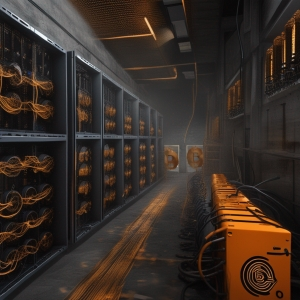Table of Contents:
Introduction: Understanding Bitcoin Mining
For many interested in cryptocurrencies, the term Bitcoin mining may seem like a complex concept shrouded in mystery. However, the process is much simpler than it may first appear. In this article, we aim to demystify Bitcoin mining, explaining the fundamentals in an easily accessible way. Our exploration will include how it works, its role in maintaining the security and stability of the Bitcoin network, and most importantly, its profitability potential. As the world's most famous cryptocurrency, understanding Bitcoin and its mining process offers valuable insights into the broader digital currency landscape.
What is Bitcoin Mining?
In essence, Bitcoin mining is the process of verifying and adding new transactions to Bitcoin’s global, public ledger - known as the blockchain. As the term suggests, it closely resembles mining of other resources like gold, only this process takes place digitally. Every time a Bitcoin transaction takes place, it needs to be validated and recorded on the blockchain. Bitcoin miners use powerful computers to solve complex mathematical problems, a procedure that verifies transaction blocks to add them to the blockchain. And what's the reward for this effort? Miners are rewarded with new Bitcoins, making mining an attractive prospect for profit.
The Best Mining Providers at a Glance
» Infinity HashFrom our perspective, currently the best mining provider on the market. With the community concept, you participate in a mining pool completely managed by professionals. A portion of the earnings are used for expansion and maintenance. We've never seen this solved as cleanly anywhere else.
» Hashing24A well-known and established cloud hosting company. With a good entry point and in a good market phase, a good ROI can also be generated with some patience. Unfortunately, we see the durations as a major drawback.
Analysing the Benefits and Drawbacks of Bitcoin Mining
| Pros | Cons |
|---|---|
| Potential for high profits | High Startup and operational costs |
| Provides transaction security for the Bitcoin network | Energy consumption and environmental impact |
| Can be a source of passive income | Market volatility and unpredictability of profits |
| Securing the decentralized network | Requires specialist hardware and technical expertise |
The Process of Bitcoin Mining

At its core, Bitcoin mining involves a network of miners from around the globe. These miners run specialized software on high-powered computers to solve complex mathematical puzzles. These problems are rooted in cryptography, with solutions both difficult to find but easy for others to verify. Each solved puzzle authenticates a bundle of transactions collected into what we call 'blocks'.
Since new blocks must meet the Bitcoin network's specific requirements, the mining process ensures that every transaction following the rules adds to the blockchain's security and transparency. Simultaneously, mining maintains a steady creation rate for new Bitcoins, mirroring the way gold is mined from the ground.
Once a miner solves the puzzle, they broadcast it to the network for verification. After confirmation, the new block gets added to the blockchain, and the successful miner receives a specified amount of Bitcoin as a reward. This procedure repeats approximately every 10 minutes and plays a crucial role in the issuance and circulation of Bitcoins.
Factors Affecting Profitability in Bitcoin Mining
Bitcoin mining can be a profitable venture depending on various factors. The first and most significant element to consider is the cost of electricity. Because mining uses high-powered computer equipment which runs continuously, energy consumption is substantial. Therefore, miners must operate where energy costs are low to maximize profitability.
Secondly, the performance of the mining hardware, often expressed as its hash rate(the number of calculations it can manage every second), also plays a pivotal role. More powerful hardware can compute more hashes per second, meaning a higher chance of mining success, but it also comes with increased costs.
Moreover, the difficulty of the cryptographic puzzles miners must solve to add a block to the blockchain adjusts approximately every two weeks depending on the global mining power. Increased competition in the Bitcoin network makes these puzzles more challenging – requiring more computation power, and thus, electricity, to solve.
Finally, the value of Bitcoin in the open market is a key factor in determining mining profitability. If the price of Bitcoin drops significantly, it could make mining unprofitable, especially if operating costs remain high.
In conclusion, while Bitcoin mining has lucrative potential, it is not without challenges. Miners must strategically assess these factors to ensure profitability while contributing to the network's security and integrity.
Advantages and Disadvantages of Bitcoin Mining

Like any potential venture, Bitcoin mining has both advantages and disadvantages one should understand when exploring this aspect of the cryptocurrency world.
The Advantages
Firstly, Bitcoin mining plays a crucial role in securing the Bitcoin network. By solving complex mathematical problems, miners validate transactions ensuring the safety and transparency of the network. Therefore, as a miner, you are contributing to Bitcoin's overall «health».
Next, should your mining efforts prove successful, the potential rewards are significant. Miners who solve the block puzzles are paid in Bitcoin which, given its fluctuating price, can offer substantial returns. Moreover, as the number of Bitcoin awarded for mining halves every four years (a process known as the halving event), potential rewards can increase over time even as the number of Bitcoin decreases.
The Disadvantages
However, Bitcoin mining does have downsides. The first of which is the cost involved, both for the specialized mining hardware and the significant electrical power it requires to run. As such, mining may not be profitable for everyone, especially those in regions with high energy costs.
Additionally, the unpredictable nature of Bitcoin's price can also impact the profitability of mining. If the value of Bitcoin falls significantly, it could make the cost of mining more than the rewards.
The increasing difficulty of mining puzzles also poses a challenge. As more miners enter the network and computational power increases, the puzzles become harder to solve. This process means that over time, mining can become less profitable unless one can consistently upgrade their equipment.
In summary, while Bitcoin mining offers potential rewards and the opportunity to support a revolutionary financial network, it's crucial to weigh these advantages against the significant upfront and ongoing costs, the competition, and market volatility.
The Future of Bitcoin Mining
As we look towards the landscape of Bitcoin mining in the future, several factors are likely to shape its trajectory. As the complexity of the mathematical puzzles miners must solve increases, so does the demand for computational power. This continual ramping up of requirements raises issues of sustainability, as the energy resources necessary for mining grow exponentially. Hence, transitioning towards renewable energy sources and developing more energy-efficient mining equipment may play a crucial role in promoting sustainable practices within the industry.
Furthermore, regulatory uncertainties around the globe may impact Bitcoin mining significantly. Some regions offer a more favorable climate for miners than others due to lower energy costs and more reliable access to the necessary hardware. Therefore, the geography of Bitcoin mining may shift as miners look for more economically viable and regulatory stable environments to operate in.
Finally, as the number of Bitcoins rewarded for mining continues to halve every four years, the profitability of mining will increasingly depend on transaction fees. Once the final Bitcoin is mined - projected to be in the year 2140 - mining rewards will solely consist of these fees. How this will affect the motivation to mine and the overall stability of the Bitcoin network remains an open question, making this an engaging space to watch in the coming years!
Conclusion: Unlocking the Mysteries of Bitcoin Mining

Understanding the mechanisms behind Bitcoin mining can appear daunting at first. However, once unraveled, it's clear that this process lies at the heart of Bitcoins decentralized nature and its global network's security. While mining can be a lucrative endeavor, it's also a complex one, requiring consideration of factors such as energy costs, computational power, mining competition, and the fluctuating value of Bitcoin itself. As with any investment, prospective miners must conduct their due diligence to weigh the potential benefits against the challenges.
Looking forward, the future of Bitcoin mining is both fascinating and uncertain. Developments in the sustainability and energy-efficiency of mining practices, regulatory changes, and the ever-evolving landscape of rewards determine the profitability and long-term viability of Bitcoin mining. As such, whether you're a potential miner or merely a curious observer, understanding the intricacies of Bitcoin mining offers a valuable window into the dynamics of the cryptocurrency world.
Conclusion: Is Bitcoin Mining Profitable?
The answer to whether Bitcoin mining is profitable or not can vary greatly depending on various factors. These include electricity costs, hardware efficiency, Bitcoin’s market value, and current mining difficulty. Keeping in mind these variables and the dynamic nature of the Bitcoin network, one must assess current scenarios before venturing into Bitcoin mining.
Considering the technology's rapid innovation, today's most powerful hardware could become outdated shortly, affecting profit margins. Additionally, the Bitcoin market can be volatile, and mining competition stiff. However, with strategic planning and a close eye on the market trends, it can indeed be a profitable venture.
Understanding the process, demands, and potential gains involved with Bitcoin mining allows individuals to make educated decisions regarding their involvement in this cornerstone of cryptocurrency operations. As such, whether it is for profit-making, contributing to the Bitcoin network's integrity, or both, each individual's Bitcoin mining journey will be a unique experience.
Bitcoin mining remains one of the critical processes that keep the cryptocurrency realm functional, enforcing its security, and creating potential avenues for significant profit.
Enlighten Yourself About Bitcoin Mining and Its Profitability
1. What is Bitcoin Mining?
Bitcoin mining is the process by which new bitcoins are produced. High-performance computers are used by miners to solve intricate mathematical problems and verify transactions in the Bitcoin blockchain.
2. How does Bitcoin Mining work?
Miners use specialized hardware to complete complex calculations that validate each transaction on the Bitcoin network. For their effort, they are rewarded with a certain amount of bitcoins.
3. Is Bitcoin Mining profitable?
Profitability depends on several factors, including the cost of electricity, the cost of mining equipment, and the hardness of mining.
4. What is needed to start Bitcoin Mining?
To start mining, one would need a mining hardware (known as a mining rig), mining software, and a source of electricity as well access to a reliable internet connection.
5. Can I mine Bitcoin on my personal computer?
While it's technically possible to mine Bitcoin on your personal computer, it's not profitable due to the high energy costs and the specialized hardware required for mining.










